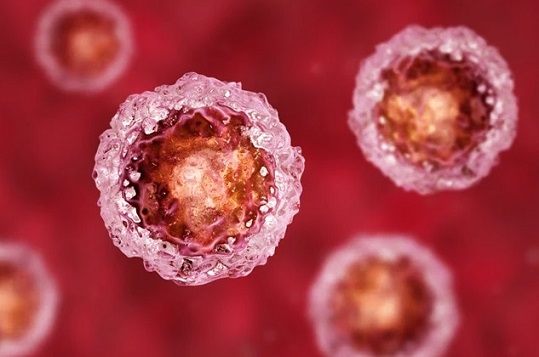Nikhil Prasad Fact checked by:Thailand Medical News Team Feb 16, 2025 1 month, 3 weeks, 4 days, 2 hours, 57 minutes ago
Medical News: Breast cancer remains the most common form of cancer affecting women worldwide. Approximately 70 - 80% of breast cancer cases are classified as estrogen receptor (ER)-positive, meaning the cancer cells grow in response to estrogen. To combat this, doctors often prescribe hormone therapies like tamoxifen, which work by blocking estrogen receptors and slowing cancer growth. However, a major challenge in treatment is that many patients develop resistance to tamoxifen over time, making it less effective.
 Adiponectin Role in Breast Cancer Stem Cells and Hormone Therapy Resistance
Adiponectin Role in Breast Cancer Stem Cells and Hormone Therapy Resistance
A recent study conducted by researchers from the University of Calabria, Italy, has uncovered new insights into how a hormone called adiponectin influences breast cancer stem cells, potentially playing a role in hormone therapy resistance. This
Medical News report explores their findings and what they mean for the future of breast cancer treatment.
The Link Between Adiponectin and Breast Cancer
Adiponectin is a hormone primarily produced by fat cells and plays a key role in regulating metabolism. Studies have shown that overweight and obese individuals tend to have lower levels of adiponectin, which has been linked to various health issues, including an increased risk of breast cancer. The new research suggests that low levels of adiponectin may contribute to the survival and growth of cancer stem cells, particularly in cases where breast cancer cells have become resistant to tamoxifen.
Breast cancer stem cells are a small group of cells within a tumor that have the ability to self-renew and resist treatment. These cells are believed to be responsible for cancer recurrence and metastasis. The study found that in tamoxifen-resistant breast cancer cells, adiponectin increased the population of these stem cells, potentially making the disease more aggressive and harder to treat.
How the Study Was Conducted
The researchers used two types of breast cancer cells: standard MCF-7 cells (which are hormone-sensitive) and tamoxifen-resistant MCF-7 cells. They grew these cells in conditions that mimic the body’s environment and treated them with adiponectin to observe its effects. Several advanced laboratory techniques were used, including flow cytometry, qRT-PCR, and Western blotting, to analyze changes in stem cell activity, cell cycle behavior, and apoptosis (programmed cell death).
Key Finding
One of the key findings was that adiponectin increased the presence of cancer stem cells marked by CD44+/CD24−/ALDH1+ characteristics, especially in tamoxifen-resistant cells. These markers indicate a high potential for self-renewal and resistance to treatment. In contrast, hormone-sensitive cells did not show significant changes when exposed to adiponectin.
The Role of Adiponectin in Cell Cycle and Therapy Resistance
Another major discovery was how adiponectin influences the cell cycle. Normally, cells go through phases of growth, division, an
d death in a controlled manner. However, in tamoxifen-resistant breast cancer cells, adiponectin appeared to slow down the cell cycle, allowing cancer stem cells to remain in a dormant state. This is significant because dormant cancer cells are known to evade chemotherapy and other treatments.
Adiponectin also seemed to protect these resistant cells from apoptosis. Researchers observed lower levels of reactive oxygen species (ROS) and increased mitochondrial stability in adiponectin-treated cancer stem cells, suggesting that the hormone helps these cells avoid self-destruction.
What These Findings Mean for Breast Cancer Treatment
The study’s results suggest that adiponectin plays a crucial role in maintaining a population of cancer stem cells in tamoxifen-resistant breast cancer. This could help explain why some patients experience a return of cancer despite undergoing hormone therapy. Understanding how adiponectin interacts with cancer cells may open the door to new treatment strategies that specifically target these resistant stem cells.
For example, therapies that block adiponectin’s effects or interfere with the pathways it activates in cancer cells could potentially enhance the effectiveness of hormone therapy. Additionally, screening for adiponectin levels in breast cancer patients may help doctors identify individuals at higher risk of developing resistance to tamoxifen.
Conclusions
This research sheds light on the complex relationship between adiponectin and breast cancer stem cells. The findings indicate that low adiponectin levels in overweight and obese patients may contribute to the persistence of cancer stem cells, making hormone-resistant breast cancer more difficult to treat. By targeting the mechanisms through which adiponectin affects these cells, future treatments could be designed to improve patient outcomes.
Further studies will be needed to confirm these findings in clinical settings and explore potential drug therapies that could counteract adiponectin’s influence on cancer stem cells. However, this research provides a crucial step toward understanding the biological factors behind hormone therapy resistance in breast cancer.
The study findings were published in the peer-reviewed journal: Cells.
https://www.mdpi.com/2073-4409/14/4/286
For the latest on Breast Cancer, keep on logging to Thailand
Medical News.
Read Also:
https://www.thailandmedical.news/news/human-cytomegalovirus-infection-and-breast-cancer-risk
https://www.thailandmedical.news/news/thailand-doctors-find-that-breast-conserving-therapy-offers-long-term-survival-for-early-stage-breast-cancer-patients
https://www.thailandmedical.news/news/breaking-covid-19-news-sars-cov-2-infections-lead-to-increased-risk-of-breast-cancer,-recurrence-of-breast-cancer-and-also-breast-cancer-metastasis
https://www.thailandmedical.news/articles/cancer
https://www.thailandmedical.news/pages/thailand_doctors_listings
